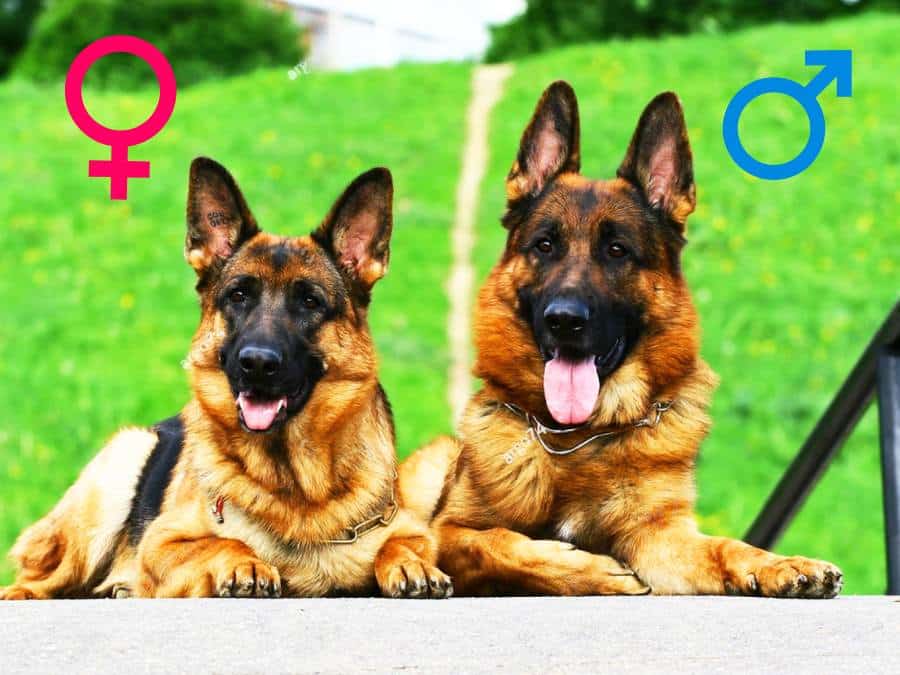Trying to decide if you should get a male or female German Shepherd?
Well, if you’re planning to get a GSD, you can’t go wrong, because German Shepherds are the best dogs in the world. (although I am a little biased, I have had 3 GSDs of my own)
But there are some slight differences between the two genders that you might want to consider before bringing one home.
So what is the difference between male and female German Shepherds?
Male German Shepherds are bigger, mature slower, and are more protective, territorial, and dominant. Female German Shepherds are slightly smaller, smarter, easier to train, and better with children.
Male vs Female German Shepherds
The most obvious difference between a male and a female German Shepherd is size. Males typically weigh between 65-90 pounds and stand around 24-26 inches tall at the shoulder. On the other hand, female GSDs usually weigh between 50-70 pounds and are about 22-24 inches tall at the shoulder.
Aside from the difference in height and weight, here are a few advantages and disadvantages to owning a female or male German Shepherd.
| Characteristics | Male German Shepherds | Female German Shepherds |
|---|---|---|
| Size and Build | Larger, heavier, more muscular | Streamlined, agile, leaner, and more feminine appearance |
| Coat | Denser with longer guard hairs, fuller appearance | Sleeker look, slightly shorter coat |
| Temperament | Stronger personality, assertive, confident | Gentler, nurturing, calmer demeanor |
| Aggression & Dominance | Higher levels of aggression & dominance, especially with other males | Generally less aggressive, may display dominance differently |
| Protective Instinct | Stronger protective instinct | Equally devoted, may express protective instincts less forcefully |
| Behavior | Bolder, goofier, more territorial, clingier | Moodier, independent, reserved, less clingy |
| Bonding | Strong bond with one person, may bond less strongly with others | Develop strong attachments to the entire family |
| Energy Levels | Slightly higher energy levels, more exuberance | High energy but adaptable to family’s activity level |
| Trainability | More stubborn behavior, may challenge authority | Easier to train, more consistent and predictable behavior |
| Maturity | Slower to mature, acts like a puppy for longer | Faster maturity, easier to potty train, and obedience train |
| Intelligence | May exhibit more independence, slightly less focused | Strong desire to please, attentive during training sessions |
| Lifespan | Shorter lifespan (median of 9.7 years) | Longer lifespan (median of 11.1 years) |
Please note that individual variations exist, and the traits mentioned are generalizations. Training, socialization, and individual temperament play significant roles in a dog’s behavior, regardless of gender.

Male vs Female German Shepherd Size
Typically, male German Shepherds are larger and heavier than females. Male GSDs tend to have a more muscular build compared to females.
Female German Shepherds tend to have a more streamlined and agile appearance compared to their bulkier male counterparts. Their bodies are often leaner with narrower heads, and narrower snouts, and they are more feminine around the eyes.
On the other hand, males possess broader chests and thicker necks, giving them a more robust, muscular, and masculine look.
The coat of a male shepherd is typically denser with longer guard hairs compared to that of a female shepherd. This results in a fuller appearance for males as opposed to the sleeker look of females.
Male vs Female German Shepherd Temperament
Although male and female GSDs share many of the same personality traits, like high intelligence, loyalty, and protective nature, there are quite a few micro differences.
Male GSDs have a stronger personality.
Male GSDs are often more assertive and confident, while females tend to be gentler and more nurturing. Males may exhibit dominance, whereas females might display a calmer demeanor.
Male German Shepherds typically show higher levels of aggression & dominance, especially towards other dogs of the same gender.
On the other hand, female German Shepherds are generally less aggressive and have a milder approach in interactions with people and animals.
Females may show dominance as well, but it can be expressed differently. They might be more focused on protecting their family rather than establishing dominance over them.
Also, most GSD owners report that male German Shepherds tend to have more stubborn behavior than females.
Males tend to be forceful protectors.
Males tend to have a stronger protective instinct, making them excellent guard dogs for homes or properties. In contrast, female German Shepherds are equally devoted but may express their protective instincts less forcefully.
Female German Shepherds also make wonderful protectors but might not exhibit the same level of possessiveness as males do over their territory or family members.

Male vs Female German Shepherd Behavior
Male German Shepherds tend to be bolder and goofier, whereas females are moodier, independent, and reserved compared to males.
Males GSDs are clingier.
A male GSD might be more likely to stay glued at your hip, eager to please you and earn your affection. While females do get attached and want to please you, they might not be as clingy as their male counterparts.
Many GSD owners report that males are cuddlier and more affectionate than females.
This is not to say that female German Shepherds are not affectionate. They just might express their affection differently than males.
Females still desire their owner’s company and want to be near to them, but they might like to maintain a level of independence at the same time.
Males tend to be more territorial.
Males often exhibit more territorial behavior. They may be more prone to marking their territory with urine.
Females can also be territorial but may be less inclined to mark their territory as extensively as males.
Many prospective owners don’t want to get a male GSD because they’re scared they’ll mark everything in the house, but if you potty train them correctly, that shouldn’t be an issue.
Click here to download the potty training guide to make potty training much easier!
Females tend to be gentler.
Female German Shepherds are gentler and friendlier towards their family as compared to males.
Females also have a higher tolerance for strangers and other people, but can also be protective, especially when it comes to their family litter and territory.
Females are also often more caring and in tune with their owner’s emotions than males.
Males often often bond with one person in the family.
Both male and female German Shepherds form strong bonds with their families. The nurturing nature of female shepherds often leads them to develop attachments to the entire family, whereas males may display a stronger bond with one particular person.
This doesn’t imply that males won’t form connections with other family members; rather, they tend to pick one person with whom they bond the strongest among all family members.
RELATED: What You Must Know Before Getting a Female German Shepherd

Male vs Female German Shepherd Traits
Males have slightly higher energy levels compared to females.
Male GSDs may exhibit more exuberance, playfulness, and enthusiasm, requiring more physical activity and mental stimulation.
Without sufficient outlets for their energy, males may become restless or display undesirable behaviors.
Females generally have energy levels that are still high but may be slightly more adaptable to the family’s activity level.
They might be more focused and task-oriented, making them adept at various activities, including obedience training.
Regular exercise and mental stimulation are essential for females as well, but they might be content with a slightly less intense routine compared to males.
Female GSDs are easier to train.
Females generally exhibit a strong desire to please their owners. This eagerness to please can make them more attentive during training sessions and more receptive to commands.
Males are often described as having a bit more independence and may exhibit a strong desire to assert themselves. They might challenge authority or test boundaries, especially during adolescence.
Females may exhibit a more consistent and predictable behavior during training, making it easier for the owner/trainer to establish routines and reinforce desired behaviors.
Female GSDs mature faster than males.
This can make it easier to potty train, leash train, crate train & obedience train female pups over males.
Since they mature slower, male GSDs will act like puppies for longer than females.
This can be fun because they’re playful and goofy during this stage, but tough because they have so much energy and can be mischievous.
Typically, puppyhood lasts until they’re about 2-3 years old, with females being on the shorter end of that spectrum and males being on the longer end.
Female German Shepherds are smarter.
Many German Shepherd owners who’ve had both males and females often report that females are smarter.
This could be because they mature faster or are less mischievous, or maybe they genetically tend to be smarter.
But just like all of the traits in this list, it mostly depends on the individual dog.
Females tend to live longer.
According to a recent study, female German Shepherds were found to live longer than their male counterparts. Female German Shepherds tend to live a median lifespan of 11.1 years, while male German Shepherds have a median lifespan of 9.7 years.
RELATED: Female German Shepherd Lifespan: How Long Do They Live

Male vs Female German Shepherd: Reproduction
The most notable difference between male and female German Shepherds is their reproductive systems and roles.
A female German Shepherd will experience her first heat cycle at 9 to 12 months old. They experience the reproductive cycle known as the estrus or heat cycle typically twice a year.
Female German Shepherds are fertile during their heat cycles, usually lasting around 2 to 3 weeks, with the most fertile period occurring in the middle of the cycle.
Male German Shepherds are fertile once they reach sexual maturity, which is typically around 6 to 12 months of age. They do not have a reproductive cycle like females. They are generally ready to mate when a receptive female is in heat.
Female German Shepherds may become more receptive to males during the estrus cycle, showing signs such as a swollen vulva and changes in behavior.
Male German Shepherds can become more interested in mating when a nearby female is in heat, displaying behaviors like increased scent marking and restlessness.
Female GSDs can be spayed to prevent heat cycles, unwanted pregnancies, and certain health issues.
Males can be neutered to prevent unwanted mating behavior, reduce aggression, and address certain health concerns.
RELATED: Neuter or Spay Your German Shepherd: Timing, Pros & Cons

German Shepherd Health Concerns
German Shepherds, both male and female, can be prone to several common health concerns. While these health issues are not exclusive to females, they affect the breed in general.
Some of the common health concerns for German Shepherds include:
- Hip Dysplasia: A genetic condition where the hip joint doesn’t develop properly, leading to arthritis and mobility issues.
- Elbow Dysplasia: Similar to hip dysplasia, this is a malformation of the elbow joint that can cause lameness and arthritis.
- Degenerative Myelopathy: A progressive spinal cord disease that affects the hind limbs, leading to weakness and paralysis.
- Exocrine Pancreatic Insufficiency (EPI): A condition where the pancreas doesn’t produce enough digestive enzymes, resulting in malnutrition.
- Gastric Dilatation-Volvulus (Bloat): A life-threatening condition where the stomach fills with gas and twists on itself.
- Hemangiosarcoma: A type of cancer that can affect the blood vessels, often found in the spleen, liver, or heart.
- Epilepsy: Some German Shepherds may be prone to seizures, which can be managed with medication.
- Panosteitis: A condition that causes inflammation in the long bones, leading to lameness and pain.
- Allergies: German Shepherds can be prone to skin allergies, food allergies, or environmental allergies.
While there may not be specific health issues exclusive to female German Shepherds, early detection and proactive care are essential for maintaining their health.

Pros & Cons of a Male German Shepherd
Male German Shepherds are often larger and more muscular than females, making them ideal for tasks requiring strength and endurance. They tend to be more protective of their family, property, and territory, making them excellent guard dogs.
Male German Shepherds are intelligent, bold, and assertive. Their confident demeanor also makes them great for activities like agility training or search-and-rescue work.
On the downside, male German Shepherds may exhibit dominance-related behaviors if not properly trained and socialized.
They can be prone to marking territory with urine, especially when in the presence of other dogs. Intact males (those not neutered) might display aggression towards other male dogs as they mature.
Pros & Cons of a Female German Shepherd
Female German Shepherds are generally smaller in size compared to males, which can make them more suitable for households with limited space.
They tend to have a calmer temperament and are less likely to engage in territorial or dominant behavior compared to males. Female German Shepherds also experience less hormonal fluctuations than males do.
However, female dogs go into heat twice a year unless spayed; this means potential bleeding around the house during these periods if not managed properly.
Also, some female dogs may show signs of maternal behavior even if they haven’t had puppies; this could manifest as excessive nesting or mothering objects like toys or shoes.

Male or Female German Shepherd: Which is Better?
When deciding between a male or female German Shepherd, several factors come into play. One essential consideration is your lifestyle and how well it aligns with the traits of each gender.
For example, if you lead an active lifestyle and seek a dog that can keep up with high-energy activities, a male German Shepherd might be suitable due to their generally larger size and more robust build.
On the other hand, if you prefer a more reserved and attentive companion, a female German Shepherd may be better suited as they are often known for being more nurturing and attentive.
It’s crucial to assess your own temperament and energy levels too; some individuals may find it easier to connect with one gender over the other based on personal preferences.
Another factor is the role you envision for your pet within your household. If you’re looking for a watchdog or guard dog, males tend to exhibit stronger protective instincts owing to their desire to assert dominance in certain situations.
Conversely, females can also make excellent protectors but are typically less territorial than males.
Ultimately, making an informed decision based on specific requirements involves weighing all these factors against what each gender brings to the table in terms of behavior patterns, physical attributes such as size and strength (for instance), and compatibility with existing pets.
RELATED: German Shepherd Pros and Cons
Frequently Asked Questions (FAQs)
Are Male or Female German Shepherds More Protective?
The level of protectiveness in male versus female German Shepherds is more influenced by individual temperament, training, and socialization than by gender alone.
Both males and females have strong protective instincts and can be dedicated guardians of their families. Males may exhibit a more assertive and dominant form of protection, while females often display a nurturing yet equally vigilant guarding behavior.

Are Male or Female German Shepherds Better Guard Dogs?
Both male and female German Shepherds can excel as guard dogs when provided with proper training and socialization. Males may display a more assertive and dominant guarding style, while females often combine protection with a nurturing instinct.
The key factors influencing their suitability as guard dogs include temperament, intelligence, and the owner’s commitment to consistent training.
Are Male or Female German Shepherds More Expensive?
The cost of male or female German Shepherds can vary based on factors such as pedigree, bloodline, breeder reputation, and regional location. Generally, there isn’t a significant difference in price between males and females.
However, specific traits, such as lineage or whether the dog is intended for breeding or show purposes, can impact pricing.
RELATED: How Much is a German Shepherd?
Are Male or Female German Shepherds More Cuddly?
Male German Shepherds tend to be more cuddlier and females tend to be independent. This doesn’t mean that females are not affectionate, but they tend to show their affection by being more turned to the owner’s emotions.
Also, factors such as socialization, training, and the dog’s unique personality play significant roles in determining their cuddling behavior.
RELATED: Do German Shepherds Like To Cuddle?
Final Remarks
You’ve now got the lowdown on the differences between male and female German Shepherds. When selecting your furry companion, consider your lifestyle and what you want in a pet. Whether it’s the protective instincts of males or the affection of females, there’s a perfect match out there for you. So, go ahead and make an informed decision based on your needs and preferences.




